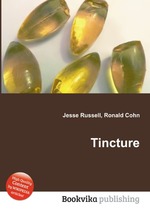Tincture
Jesse Russell Ronald Cohn
бумажная книга
High Quality Content by WIKIPEDIA articles! A tincture is an alcoholic extract (e.g. of leaves or other plant material) or solution of a non-volatile substance (e.g. of iodine, mercurochrome). To qualify as a tincture, the alcoholic extract is to have an ethanol percentage of at least 40-60% (80-120 proof) (sometimes a 90% (180 proof) pure liquid is even achieved). In herbal medicine, alcoholic tinctures are often made with various concentrations of ethanol, 25% being the most common. Other concentrations include 45% and 90%. Herbal tinctures do not always use ethanol as a solvent, though this is the most frequent. Other solvents include vinegar, glycerol, ether and propylene glycol, not all of which are used for internal consumption. However, where a raw solvent`s pH factor is a sole consideration, the advantage of ethanol is that being close to neutral pH, it is a good compromise as a passive used solvent of both acidic and alkaline constituents where a tincturing methodology is concerned. Glycerine, when utilized in a tincture methodology`s passive (i.e. `non-critical`) manner, is a poorer solvent generally, and vinegar, being acidic, is a better solvent of alkaloids but a poorer solvent of acids, which would result in the alkaloids being more present in the preparation than otherwise. However, for people who do not imbibe alcohol for medical, religious or moral reasons, non-alcoholic (glycerite) tinctures are an alternative.


